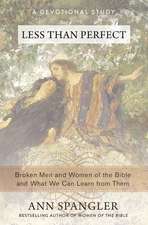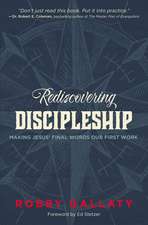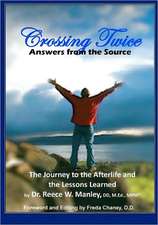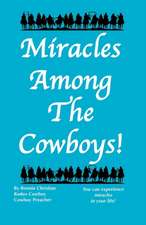The Forgotten Jesus: How Western Christians Should Follow an Eastern Rabbi
Autor Robby Gallaty Adam Verneren Limba Engleză CD-Audio – 18 iul 2017
Through the years, our understanding of Jesus has been shaped by different cultural influences, and many Western Christians have formed an inaccurate perspective of Jesus and his teachings, beliefs, and ways of acting.
In Robby Gallaty's deeply reformative book, he reveals the essential Hebraic culture, customs, and nuances many Christians have forgotten or never learned. And he argues that as long as Jesus's Jewish context is misplaced and misunderstood, our understanding of the Bible, our faith, and the church falls far short.
The Forgotten Jesus will open your eyes to:
- The first-century world in which Jesus lived and its connection to the time of the Old Testament.
- The vast differences between the Western and Middle Eastern mind, and how our modern approach to understanding the Bible is influenced far more by the Greeks and Romans than by a Hebrew way of thinking.
- Essential textual connections between the parts of the Bible that we often overlook.
- Important Hebraic perspectives on the Messiah to point out some errors many Christians have believed through the years.
- Why Jesus’s words on the cross about God forsaking him may have deeper meaning than we realize.
Preț: 163.83 lei
Nou
Puncte Express: 246
Preț estimativ în valută:
27.67€ • 30.07$ • 23.26£
27.67€ • 30.07$ • 23.26£
Indisponibil temporar
Doresc să fiu notificat când acest titlu va fi disponibil:
Se trimite...
Preluare comenzi: 021 569.72.76
Specificații
ISBN-13: 9781538461549
ISBN-10: 1538461544
Dimensiuni: 145 x 145 x 28 mm
Greutate: 0.23 kg
Editura: TWO WORDS PUB LLC
ISBN-10: 1538461544
Dimensiuni: 145 x 145 x 28 mm
Greutate: 0.23 kg
Editura: TWO WORDS PUB LLC
Descriere
Descriere de la o altă ediție sau format:
We have lost an essential understanding of Jesus—his Jewishness.
Through the years, our understanding of Jesus has been shaped by different cultural influences, and many Western Christians have formed an inaccurate perspective of Jesus and his teachings, beliefs, and ways of acting.
In Robby Gallaty's deeply reformative book, he reveals the essential Hebraic culture, customs, and nuances many Christians have forgotten or never learned. And he argues that as long as Jesus's Jewish context is misplaced and misunderstood, our understanding of the Bible, our faith, and the church falls far short.
The Forgotten Jesus will open your eyes to:
We have lost an essential understanding of Jesus—his Jewishness.
Through the years, our understanding of Jesus has been shaped by different cultural influences, and many Western Christians have formed an inaccurate perspective of Jesus and his teachings, beliefs, and ways of acting.
In Robby Gallaty's deeply reformative book, he reveals the essential Hebraic culture, customs, and nuances many Christians have forgotten or never learned. And he argues that as long as Jesus's Jewish context is misplaced and misunderstood, our understanding of the Bible, our faith, and the church falls far short.
The Forgotten Jesus will open your eyes to:
- The first-century world in which Jesus lived and its connection to the time of the Old Testament.
- The vast differences between the Western and Middle Eastern mind, and how our modern approach to understanding the Bible is influenced far more by the Greeks and Romans than by a Hebrew way of thinking.
- Essential textual connections between the parts of the Bible that we often overlook.
- Important Hebraic perspectives on the Messiah to point out some errors many Christians have believed through the years.
- Why Jesus’s words on the cross about God forsaking him may have deeper meaning than we realize.
Cuprins
Introduction:Why Do We Need to Rediscover Jesus?The introduction will examine how Hellenism and Romanism have forced many Christians to read an Eastern book through a Western lens. Gallaty will explain how the refurbishment of the Sistine Chapel is a perfect example of restoring the original picture of something that has been affected through the ages. Jesus is not a blue-eyed, brown-haired American, as many have come to see Him. He’s a dark-skinned, Middle Eastern Rabbi. Chapter 1:Preparing the Way for the MessiahThis chapter will give a brief overview of how God providentially used pagan leaders to prepare the way for His Son. Alexander the Great (Hellenism), Julius Caesar (the Roman Road), and Herod the Great (Construction of the Temple) set the stage for the coming Messiah spoke about in the Old Testament. The Maccabean revolt, often overlooked by Protestants because of its inclusion in the Apocrypha, re-instituted Temple sacrifices, duties, and festivals, all of which were necessary for the ministry of Jesus. Gallaty will explain how Jesus was not the first person to claim divinity or to be the Messiah. In fact, twelve men claimed to be the Messiah during the 100 years before and after Jesus. Readers will also walk through the community of the Essenes, who laid a foundation for the Messiah by taking the words Isaiah 40:3-5 literally. They gave up the luxuries of the Temple to endure sweltering heat, unbearable sand storms, and isolation to witness firsthand the glory of the Lord. Chapter 2:Clues About the Christ in the Old Testament The Old Testament repeatedly points to the Messiah through the life of Joseph, who foreshadowed Christ. A motif that Gallaty will examine is that of the shepherd in the Old Testament. Next, we will journey back to Babylon to uncover how Gentile wise men from a far away land knew when and why to follow a star from the East---and we will see that they were disciples of an influential Jew named Daniel, who specialized in prophecy about the coming Messiah. Finally, we will consider the many connections between Abraham’s sacrifice of his only son Isaac and God’s sacrifice of his only son Jesus. Chapter 3:The Humanity of JesusAn understanding of the humanity of God will ignite a better understanding of His character and an understanding of Jesus’ upbringing will shed light on His future ministry. We will explore why He was raised in Nazareth, and we will also come to understand what is meant by Jesus growing in stature and wisdom. Jesus, like his father Joseph, was probably a stone mason who worked at a rock quarry nearby. This sheds new light on his ministry as we rethink truths he spoke in the New Testament, “Upon this rock I will build my church,” or “The stone the builders rejected has now become the cornerstone.” Chapter 4: Speaking the LanguageHebrew thinking is much different from Greek thinking. For a Jew, salvation is always corporate and plural, not individual and singular as we have been taught in the West. Additional concepts that will be covered are spirituality vs. worship, dynamic vs. static, ideas vs. pictures, and photographic appearance (a description of an object or thing) vs. constructive appearance (how an object or thing is built). Gallaty will identify a method for uncovering keshers, or hyperlinks from the New Testament to the Old Testament, by examining well known passages such as the Upper Room discourse in John 14, when Jesus said, “I’m coming back to get you,” the feast of Tabernacles, when Jesus said, “If anyone is thirsty let him come to me and drink,” and his encounter with Zacchaeus, when he said, “I’ve come to seek and save the lost.” Finally, we will uncover what Jesus meant when he said, “You have turned my Father’s house into a den of robbers,” from a Hebraic perspective. Chapter 5:Following a Jewish Rabbi in the Kingdom of GodThroughout Jesus ministry, many messianic clues are imbedded in the miracles He performed. The Kingd

















